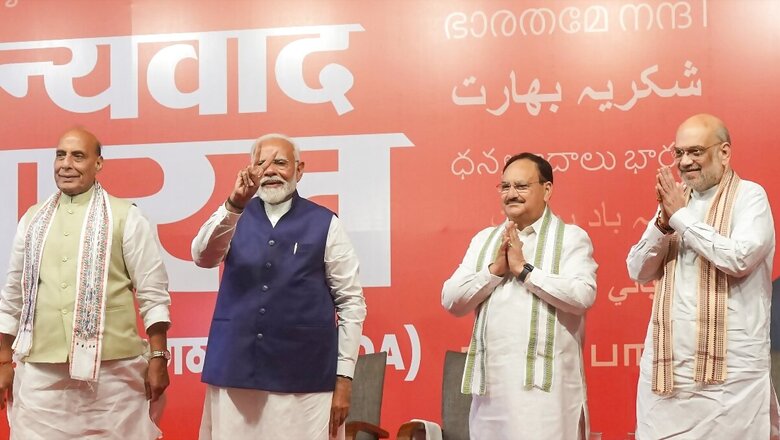
views
The fact that the Bharatiya Janata Party (BJP) has to depend on its allies for running the government has led to misgivings about the new government’s ability to carry forward economic reforms. The misgivings are ill-grounded because what is important for liberalisation is intent, not numbers. And on that count, the BJP-led National Democratic Alliance government doesn’t falter.
But let’s see what concerns rating agencies and experts have expressed. “We believe major reforms to land and labour laws will remain on the new government’s agenda as it seeks to enhance India’s manufacturing sector, but these have long been contentious and the NDA’s weaker mandate will complicate their passage further. This could reduce the potential upside to India’s medium-term growth prospects,” Fitch Ratings said in a statement.
Christian de Guzman, senior vice president of Moody’s Ratings, also has concerns. While he was upbeat about policy continuity, especially infrastructure building and support to manufacturing, the NDA’s “relatively slim margin of victory, as well as the BJP’s loss of its outright majority in Parliament, may delay more far-reaching economic and fiscal reforms that could impede progress on fiscal consolidation.”
Fourteenth Finance Commission Member and former National Institute of Public Finance & Policy director M. Govind Rao told a newspaper, “In a coalition environment it may not be easy to carry out big bang reforms, but the thrust of incremental reforms should be in this direction.”
These concerns seem commonsensical, but history suggests otherwise. The prime minister who started reforms, P.V. Narasimha Rao, ran a minority government. His government just managed to survive the vote of no-confidence in 1993 using the means which did not cover him in glory. But, despite the precariousness of his government, he was able to liberalize the economy by, among other things, delicensing industry, abolishing the office of the Controller of Capital Issues, ending public monopoly, facilitating foreign direct investment (FDI), and reducing tariffs.
The Atal Bihari Vajpayee government (1998-2004), with the BJP’s 182 seats, was more dependent on NDA constituents than Modi 3.0 is. And yet, it adopted a far bolder approach towards reforms than its predecessors. Emblematic of this boldness was privatisation, for it is the most visible rollback of the state from the economy. This is also the reason that the enemies of liberalisation—socialists, communists, and indeed most politicians and public intellectuals—are fiercely opposed to the sale of public sector undertakings (PSUs). All of them raised a stink when the Vajpayee government privatized Balco in 2001.
The then chief minister of Chhattisgarh, Ajit Jogi, went to the extent of threatening the cancellation of the mining and land lease of the privatised entity. However, the Vajpayee government not only persisted and completed the sale but also sold other PSUs.
Another major reforming measure was the introduction of the Fiscal Responsibility & Budget Management (FRBM) Act, which it tried to abide by. The NDA government under Modi is also committed to the FRBM Act, as evident from the declining fiscal and revenue deficits in the last few years. The Vajpayee regime was able to continue with reforms because it had the intent to do so.
On the other hand, the Congress-led United Progressive Alliance (UPA) government under Manmohan Singh never had that intent. During 2009-14, the grand old party had 24 more seats in the Lok Sabha than the BJP had during 1999-2004; besides, it didn’t have to suffer the communists who had earlier (2004-08) supported the UPA from outside; and yet, it did little to promote the cause of liberalisation. In fact, it came up with the fiscally ruinous and economically disastrous National Food Security Act in 2013 under the pressure of Sonia Gandhi who, in turn, was guided by the National Advisory Council—a circus comprising socialists, pinkish intellectuals, poverty-perpetuating activists, and green extremists.
PM Modi has made his intent about reforms very clear on more than one occasion. He and his supporters talk about making the third largest economy, making GDP $5 trillion, infrastructure development, fiscal responsibility, and other free market ideas. He seems to have seen through the games that Left-wing thinkers play, the way they tend to undermine reforms by mischievously using the concepts of ‘inclusion’ and ‘equity.’
Also, Modi is not beholden to the populist ideas—or ‘revdis,’ as he calls them. To be sure, the BJP governments at the Centre and in states do indulge in populism; PM-Kisan is one example. But, unlike other parties, populism is not the defining feature of the BJP. The characteristic features of the Congress’ economic philosophy are doles and entitlements, as evident from its 10-year from 2004 to 2014. It is true that under Narasimha Rao the GOP began reforms, but at present it is under the control of the Gandhi family whose Leftward tilt is well-known.
As for the Aam Aadmi Party’s economic policy, it begins and ends with freebies. Various socialist parties, being staunch Lohiaites, are so focused on social justice that they find it a waste of time to think about the economy. Regional parties don’t think beyond their own states, parochial pride, and populism.
Only the BJP has the intent and the bandwidth (despite lower numbers in the Lok Sabha) to carry out economic reforms. Hopefully, the BJP-led NDA will do that.
The author is a freelance journalist. Views expressed in the above piece are personal and solely those of the author. They do not necessarily reflect News18’s views.


















Comments
0 comment